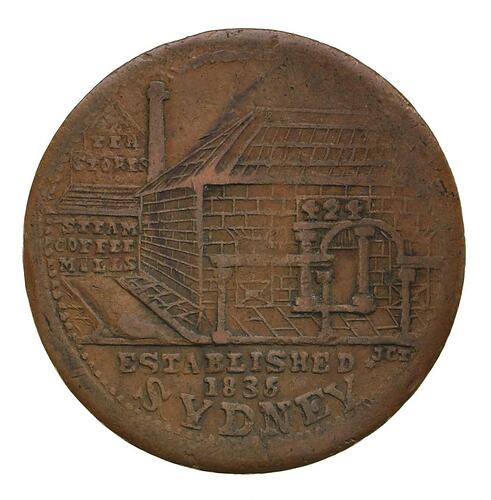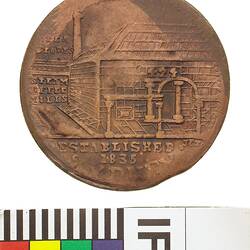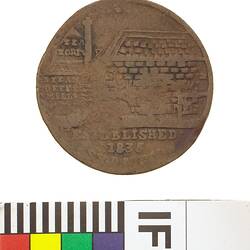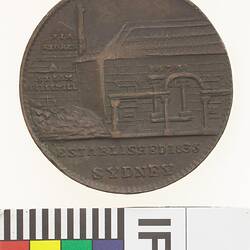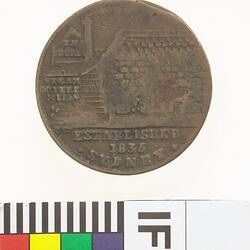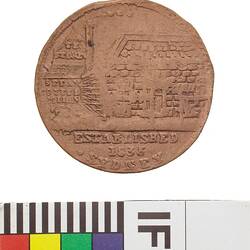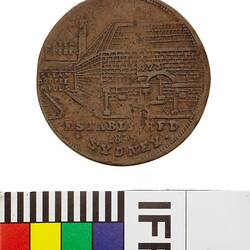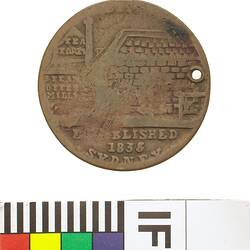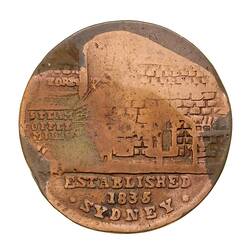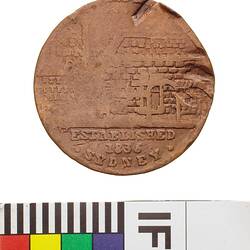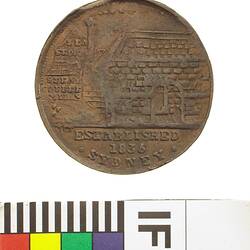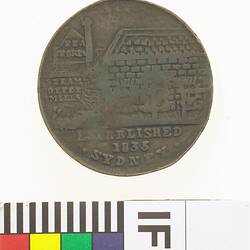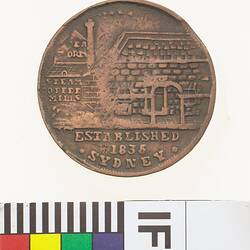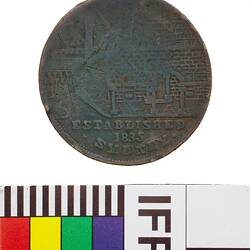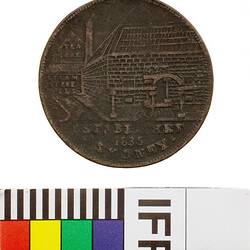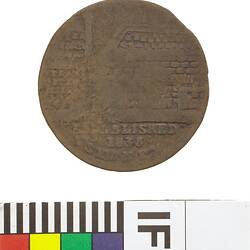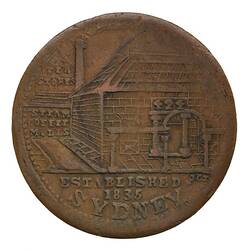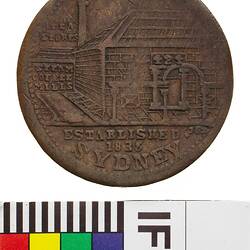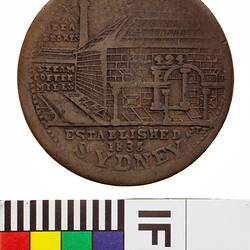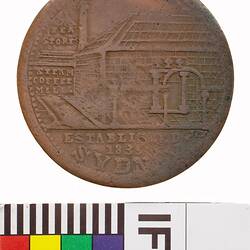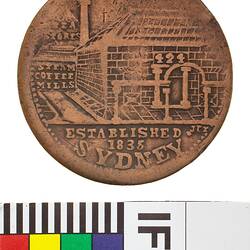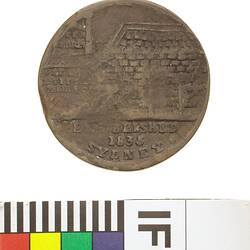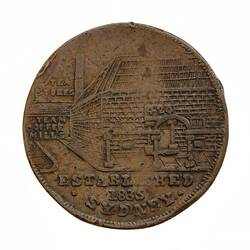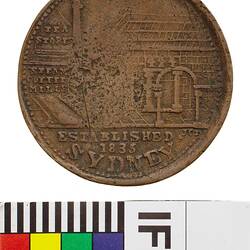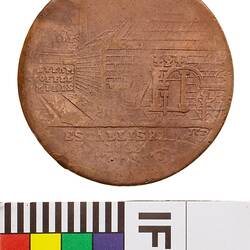Chronology of S. Peek and Co., Sydney Tea and Coffee Merchant, issuer of the Tea Stores Tokens:
1835: Sam Peek and his wife arrived in Sydney on the Richard Walker in November. His brother Richard emigrated about the same time. Sam joined with another free settler, John Webb, in a Grocery and Tobacco business that was listed in the current directory as 'S. Peek and Co. at Raby's Building, George Street.'
1838: By this date Sam, with John Webb, had joined up with Sam's brother Richard and Edward Campbell in the firm of Peek and Campbell at 424 George Street - a large and important grocery business. They had purchased land behind their shop linking it to Pitt Street and set up a 'Steam Coffee Mill.' Sam Peek was at the time involved in several entrepreneurial activities in the Sydney commercial scene and was acquiring land holdings in the Gosford area. 'Caroline Street (named) after his wife and 'Webb Street' after his business partner, still exist here. Likewise the name 'Peek's Point' still survives nearby.
1839: The business was so prosperous that Sam Peek and John Webb were able to sell their share of it for £20,000 to the other partners, a huge amount in those days. This possibly indicated their intention to leave the monopoly to the other partners of this enterprise and use their entrepreneurial talents elsewhere. However, some eighteen months later both Sam and John had returned to the grocery import business which seemed (to Richard) as an unfair confliction with the previous sale agreement.
1841: This ultimately led to an acrimonious court case between the brothers which resulted in Sam entering in an extended period of insolvency.
1844: In the depression of this period Richard Peek and Edward Campbell were forced to dissolve the partnership of Peek and Campbell. Although Campbell was able to untangle his affairs and open up as E. Campbell and Co. next door to the old premises, he remained distinctly separate from his former partners. By 1848 Fowles' publication illustrates separate premises in that location and he ceased trading by 1852. There seems no evidence in contemporary documents linking Campbell with the Tea Stores token issue of 1852-1853. Despite this the tokens are too often quoted as Peek and Campbell.
1845/46: Richard Peek recovered enough to open a totally separate enterprise at No. 452 George Street East, five numbers south of the 'New' Post Office on what is now the corner of Martin Place and another in Macquarie Place, retiring in 1869. Sam Peek, fighting insolvency, joined with John Webb to form S. Peek & Co. at the old premises at 424 George Street. However, soon after this Robert Porter took over Sam's interest (so the latter could concentrate on clearing the insolvency) and named the business R. Porter & Co..
1847: Sam Peek (mostly clear of his debts, though not entirely until 1850) again took a major interest in 424 George Street, renaming the business S. Peek & Co., while Porter remained in the background. In addition to his commercial interests and troubles in a busy life, Sam found time for involvement in the radical politics of a group of traders (which included a young Henry Parkes) from about 1846 to 1854. This group championed the rights of ordinary colonists against the established landed classes. Sam was elected to the City Council for the years 1851-52.
1850: Between 1850 and 1854 Sam Peek and his wife occupied (rented?) 'Richmond Villa', a substantial house situated in the Domain behind the present State Parliament. This residence was removed stone by stone to Newtown, where today it is the headquarters of the NSW Genealogical Society.
1852: The Tea Stores tokens made their appearance, being the first recorded as manufactured locally. J. Thornthwaite, the die sinker, had these produced initially from blanks sawn laboriously from copper rods obtained through Sam's interest in the 'Burra Burra' copper mine in South Australia. A crude drop hammer arrangement, replaced by a crude press, were used to strike the blanks with indifferent results. Some early halfpennies clearly show evidence of the copper rod 'sawn blank' procedure, before a change of quality to the 'punched' blanks out of salvaged copper sheet improved production but not quality for the majority of tokens. So far no existent pennies show evidence of 'sawn blank' origins.
1855: S. Peek and Co. had ceased trading when Sam Peek transferred his interest entirely to many other projects, which included the building of a hotel in the Gosford area. There is also evidence that both Sam and his wife left for England by late 1854. Josiah Harpur, then Betteridge & Haydon, separately took over the premises under their own names (retaining the Steam Coffee Mill brand) - this arrangement apparently continued until the site was redeveloped in 1866.
1857: Sam and Caroline Peek, returning to Sydney from England, were among those lost when the sailing ship Dunbar was wrecked at the Gap situated at the south head of Sydney Harbour. Their bodies were never found and the estate reverted to the Crown as they had no designated heirs and the feud with Richard Peek remained unresolved. The part-built hotel at Gosford and other projects planned by Sam were never completed. Only the Tea Stores tokens and the 'Peek's Point' names on the map of Gosford survive as reminders of one of our early enterprising 'token' characters.
References:
Andrews, A. (1921) Australasian Tokens and Coins
Buckland, J., (1988). Mort's Cottage: impressions of Sydney people and their times. Kangaroo Press, Sydney.
Ford's Directory, 1837-1844.
Fowles, J., Sydney in 1848.
Heyde, G.C., Unofficial Coins of Colonial Australia and New Zealand.
Macarthur Papers, 1805-1888.
NSW Government Gazette, 1815-1870.
Records of Old Sydney (Devonshire Street) Cemetary, Dixon Collection.
Skinner, D.H, Coin and Banknote Guide.
Sydney Gazette, 1835 to 1845.
Sand's Directories, 1845-1870.
Waugh & Cox Directories, 1851 et. seq.
Misc. personal papers - private sources.
Advertisement, Waugh's Australian Almanac for 1858, advertisements, p.30.
More Information
-
Keywords
Trade Tokens, tea merchants, coffee, grocery shops, tobacconist shops
-
Localities
-
Authors
-
Article types
